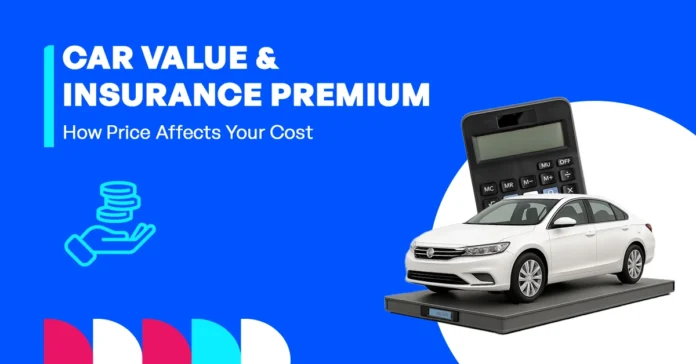The value of your car plays a significant role in determining your car insurance Dubai premium. Insurance companies assess the risk and potential cost of claims based on your vehicle’s market value, directly influencing the amount you pay for coverage. Generally, high value car insurance premiums are higher because luxury or expensive cars are more costly to repair or replace, while lower-value vehicles typically cost less to insure.
Understanding this relationship can help you make informed decisions when purchasing a car or selecting a car insurance in Dubai policy. Factors such as depreciation, vehicle model, and safety features also affect your premium, making it essential to evaluate your vehicle’s worth before securing coverage. If you’re interested in exploring this topic further, keep following along!
How Do Insurance Companies Value Your High Value Car in Dubai?
Car insurance Dubai providers determine your car’s value based on several key factors, ensuring an accurate premium calculation. They typically use the market value approach, considering your vehicle’s make, model, year of manufacture, mileage, and overall condition. Insurers also reference dealer listings, industry valuation tools (such as Dubizzle and CarSwitch), and historical depreciation rates to estimate the car’s worth.
Additionally, if your car is imported, high value car insurance providers may factor in customs duties and the availability of spare parts, which can affect its insured value. Some companies offer an agreed value policy, allowing owners of luxury or classic cars to set a predefined value with the insurer.
Car Insurance Dubai: Value vs Market Value
The market value of a car refers to its current worth in the open market, determined by factors like make, model, age, mileage, and demand. This value fluctuates over time due to depreciation and market conditions.
The Car Insurance in Dubai value, on the other hand, is the amount your insurer considers when calculating your policy and potential payouts. It can be based on the car’s market value or an agreed value (a fixed sum negotiated between the insurer and the policyholder). In the event of a claim, insurers typically reimburse based on the actual cash value (market value minus depreciation) unless otherwise specified.

How Does High Value Car Insurance Determine Car Value When Totaled?
When a car is totaled, meaning the repair cost exceeds a certain percentage of its value (usually 50-70%, depending on the insurer and region), the car insurance company in Dubai determines its payout based on the actual cash value (ACV) at the time of the accident.
How Do Insurers Determine Car Value for Car Insurance in Dubai?
The following are the main factors that help your insurer determine your car’s value:
- Market Value Assessment for Car Insurance Dubai:
Insurers check recent sales of similar vehicles in your area, taking into account the make, model, year, trim, mileage, and condition. - Depreciation Factor in High Value Car Insurance:
The car’s age and wear and tear reduce its worth. A newer car has a higher ACV, while an older one is valued lower. - Vehicle History & Upgrades:
Accident history, modifications, and added features (such as custom rims or a premium sound system) may affect the final valuation. - Third-Party Valuation Tools for Car Insurance Dubai:
Companies often use platforms like CarSwitch, DubaiCars, PriceMyCar, CashYourCar UAE, or SellYourMotors as local valuation databases to estimate the payout.
Utilizing these tools can help you obtain a precise valuation of your car, ensuring you secure appropriate high value car insurance coverage based on its current market value.
If you disagree with the insurer’s valuation, you can negotiate using independent appraisals or recent sale listings of similar cars.
Tips to Maximize Your High Value Car Insurance Claim in Dubai
If your car is damaged or totaled, following these steps can help you get the highest possible payout from your car insurance Dubai provider:

1. Document Everything Immediately
Take clear photos and videos of the damage, the accident scene, and the surrounding area.
Get a police report (this is mandatory in the UAE for insurance claims). If available, collect witness statements.
2. Know Your Car’s True Value
Use third-party valuation tools like CarSwitch, DubiCars, or Kelley Blue Book (KBB) to check your car’s market value.
Also, provide maintenance records and recent upgrades, such as new tires or custom parts, to support a higher valuation.
3. Don’t Accept The First Offer
Insurers often offer a lower initial payout—negotiate based on independent valuations and similar car listings.
Highlight any added features or conditions that make your car worth more than their estimate.
4. Choose A Trusted Repair Shop
If your car insurance in Dubai policy includes repairs, use an authorized workshop.
Request a detailed repair estimate before approving any work.
5. Be Aware Of Depreciation Rules
If your car is new or luxury, check if your policy includes “agreed value” coverage to avoid excessive depreciation deductions.
Ask about gap insurance if you have a financed car; it covers the difference between the market value and your loan balance.
Why Do Car Insurance Companies in Dubai Ask for Your Car’s Value?
Car insurance Dubai providers ask for the value of your car to accurately determine your premium, coverage limits, and potential payout in the event of a claim.
The car’s value directly affects how much the insurer would have to pay in the event of theft, damage, or total loss. Key Reasons Insurers need your car’s value are as follows:
Premium Calculation for High Value Car Insurance:
Higher-value cars typically cost more to insure since they have higher repair or replacement costs.
Coverage Type Determination:
Some policies, such as comprehensive or collision insurance, require an estimated car value to determine the proper coverage.
Claim Payout Estimation:
In case of a total loss, Insurers determine whether to repair or replace the car based on its market value.
Depreciation Consideration:
Since cars lose value over time, insurers adjust coverage and payouts accordingly.
How to Ensure a Fair Valuation for Your Car in Dubai Car Insurance?
To make sure your insurer values your car fairly, follow these steps:
1. Use Trusted Valuation Tools for Car Insurance Dubai
Check platforms like CarSwitch, DubiCars, Kelley Blue Book (KBB), or Edmunds to get an accurate estimate of the market value. This helps you compare the insurer’s estimate with real-world pricing.
2. Provide Accurate Car Details
When applying for insurance, be honest about your car’s make, model, year, mileage, condition, and modifications. High-value upgrades, such as premium sound systems or alloy wheels, may increase the car’s value.
3. Keep Maintenance & Service Records
Well-maintained cars often hold higher value. Keep service history, accident reports, and receipts for repairs to support a better valuation.
4. Negotiate With The Insurer
If the insurance company undervalues your car, present independent valuations and recent listings of similar vehicles to support your case.
5. Opt for Agreed Value Coverage in High Value Car Insurance
Some insurers allow you to set a pre-agreed value, particularly for luxury or classic cars, which ensures better compensation in the event of a claim.
What Factors Influence the Cost of High Value Car Insurance Premiums in Dubai?
Several factors influence the cost of a Car Insurance Dubai premium, including your vehicle type. Luxury or high-performance vehicles cost more to insure because of their higher repair costs.
Younger or less experienced drivers typically face higher premiums due to the increased risk of accidents. The make, model, and age of your car also impact premiums, with luxury or high-performance vehicles costing more to insure due to higher repair and replacement costs.
Your driving history, including past accidents or violations, plays a significant role. Additionally, your location can affect premiums, as high-traffic areas or regions with high crime rates may lead to higher rates.
Additionally, the type of coverage you choose, your deductible amount, vehicle safety features, and even your credit score can all affect the cost of your insurance premium.
Final Thoughts on Managing Car Insurance Costs in Dubai
Your car’s value undeniably shapes your car insurance in Dubai premiums, but knowledge is power. By leveraging valuation tools, maintaining accurate records, and negotiating with insurers, you can ensure fair pricing, even for high-value car insurance. Whether your car is new or luxury-focused, staying informed about market trends and policy options helps you balance coverage and cost effectively. Start by comparing car insurance Dubai quotes today to maximize savings without compromising protection.
Key Takeaways:
- Tips to maximize claim payouts:
- Document damage & get a police report.
- Use independent valuations (e.g., Kelley Blue Book).
- Negotiate with insurers—don’t accept the first offer.
- Opt for agreed value coverage (for high-end cars).
- Factors increasing premiums:
- Luxury/high-performance cars.
- Young/inexperienced drivers.
- Poor driving history or high-risk location.
- Save on premiums by:
- Comparing quotes.
- Maintaining service records.
- Choosing higher deductibles.
Frequently Answered Questions
1. How does my car’s value affect my insurance premium?
Higher-value cars typically have higher premiums due to increased repair or replacement costs, while lower-value cars are generally less expensive to insure.
2. How do insurers determine my car’s value?
They use market value assessments, depreciation, third-party valuation tools, and factors like make, model, mileage, and condition.
3. Can I negotiate the valuation of my car’s insurance?
Yes. If you believe the insurer undervalued your car, provide independent valuations, service records, and comparable listings to support your case.
4. How can I maximize my claim payout?
Document everything, get a police report, use valuation tools, and don’t accept the first offer; negotiate if needed.
5. Does the value of a claim affect insurance?
Yes, the value of a claim can affect your insurance in several ways. Larger or frequent claims may increase your premiums, as insurers may consider you a higher-risk driver. Additionally, making a claim can cause you to lose your No Claims Discount (NCD), which helps lower your premiums over time. The type of claim also matters; at-fault claims typically lead to higher premium increases compared to non-fault claims. In some cases, it may be more beneficial to pay for minor damages out of pocket to avoid a potential premium hike. It’s important to weigh the costs before filing a claim.



